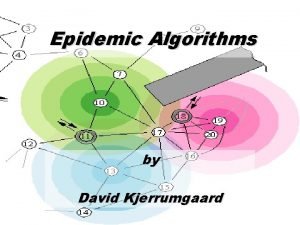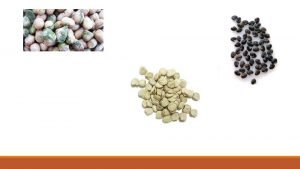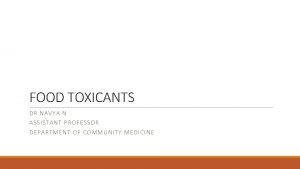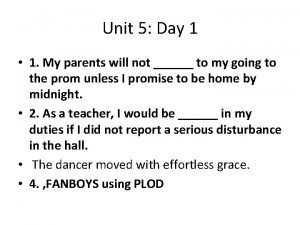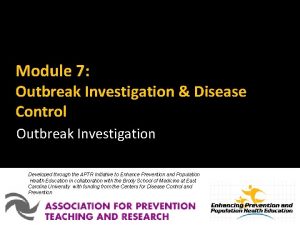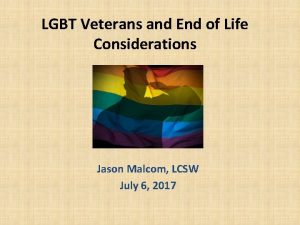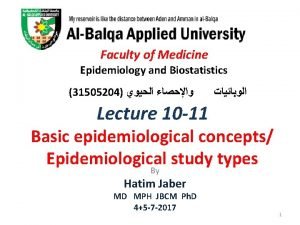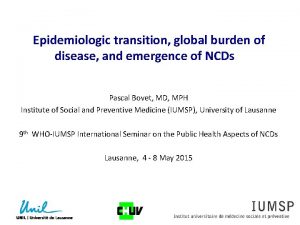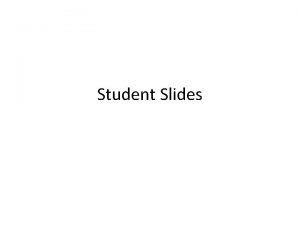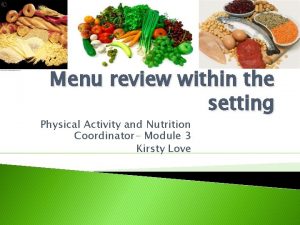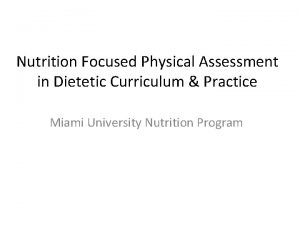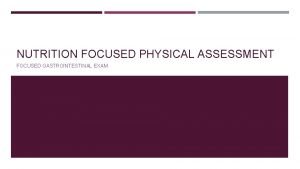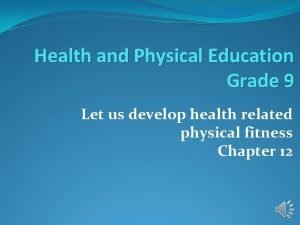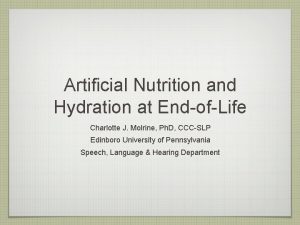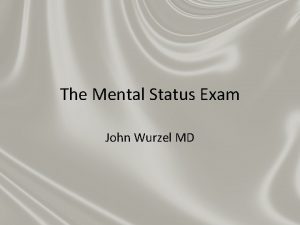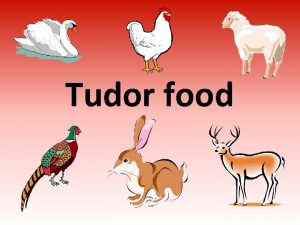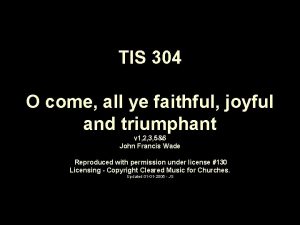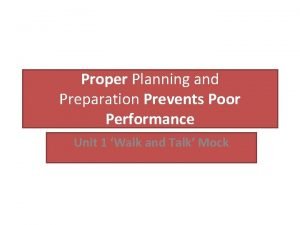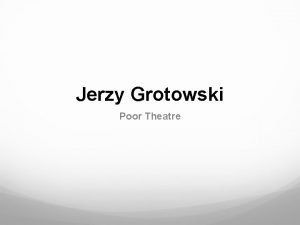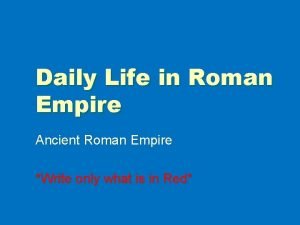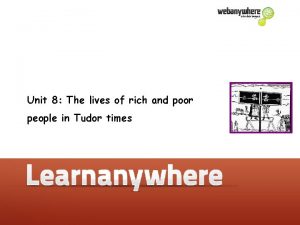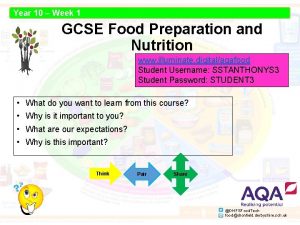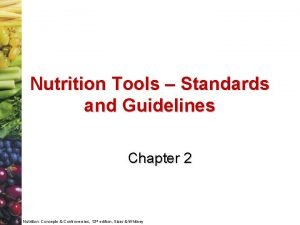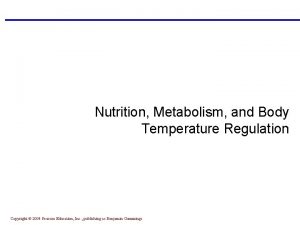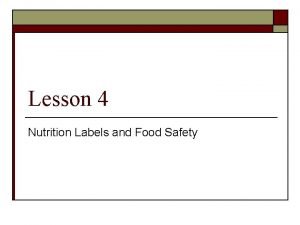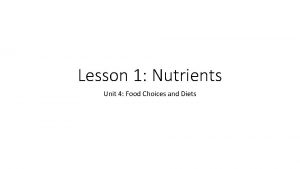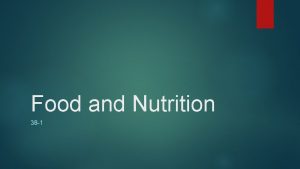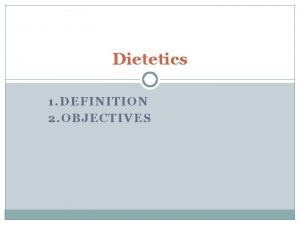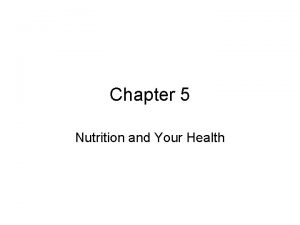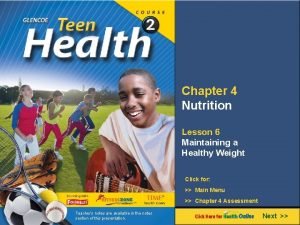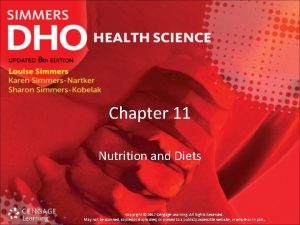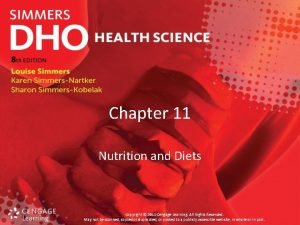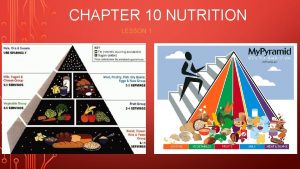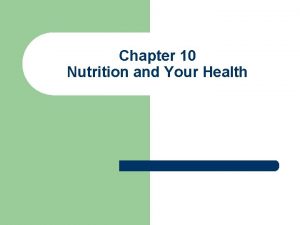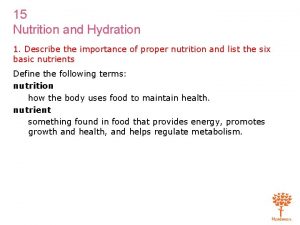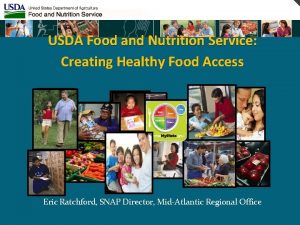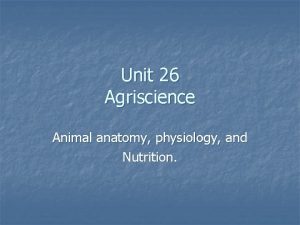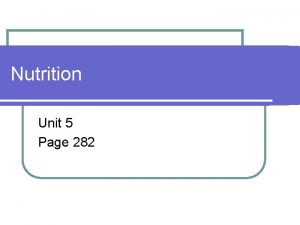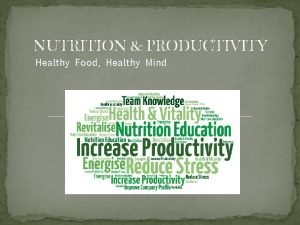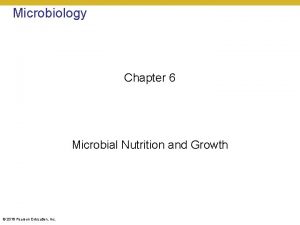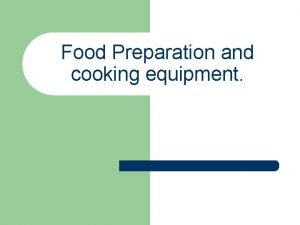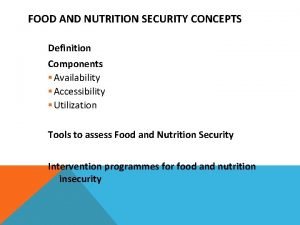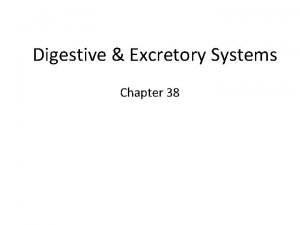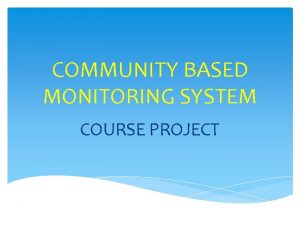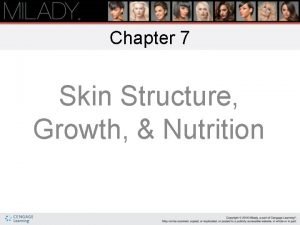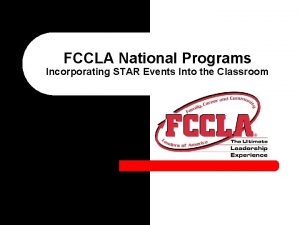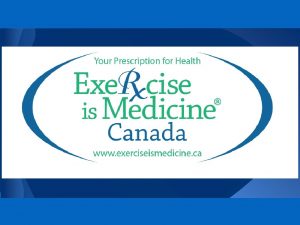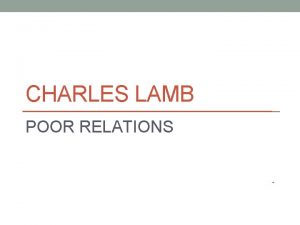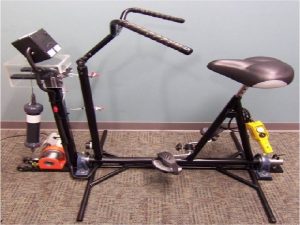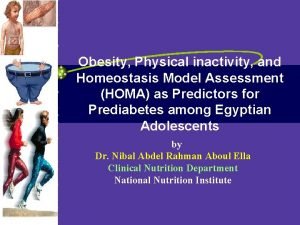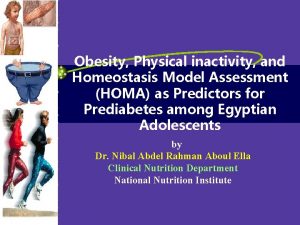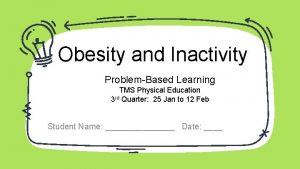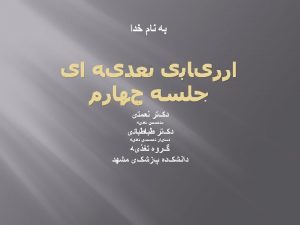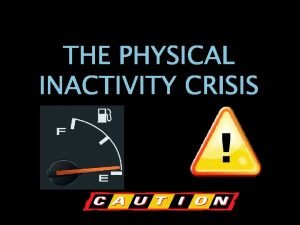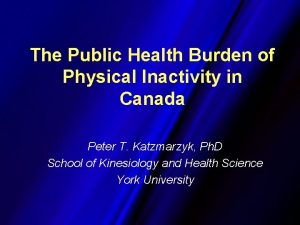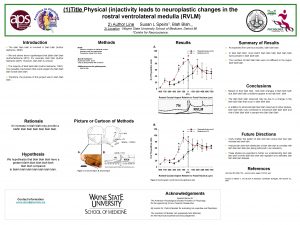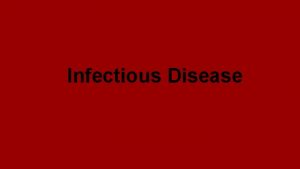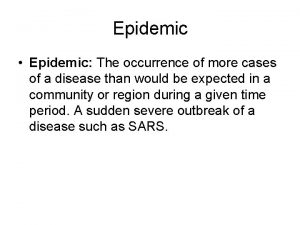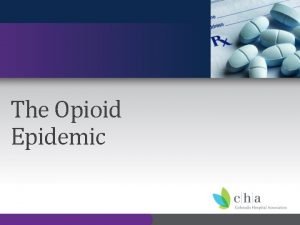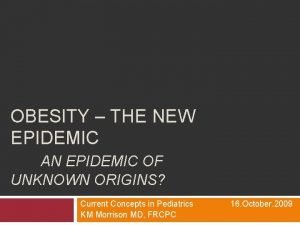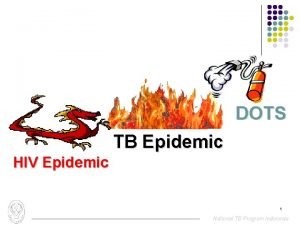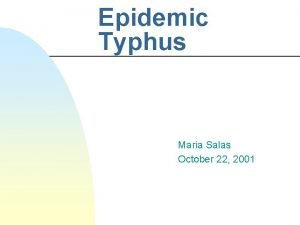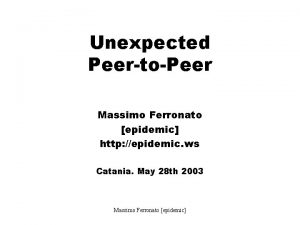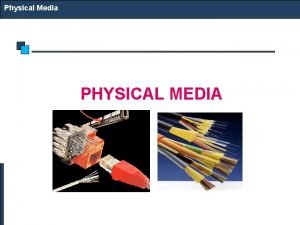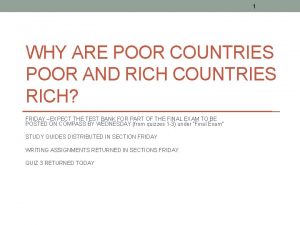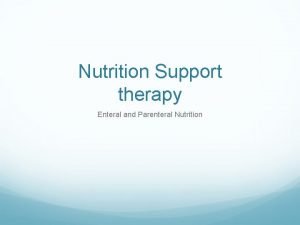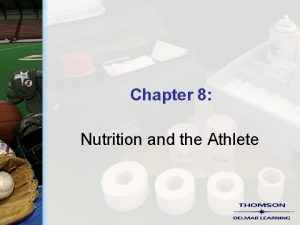An epidemic of poor nutrition and physical inactivity
































































- Slides: 64

An epidemic of poor nutrition and physical inactivity: Local strategies and efforts to turn the tide May Okihiro, MD, MS UH JABSOM Department of Pediatrics Waianae Coast Comprehensive Health Center Funding for this project was provided by the HMSA Foundation.

Objectives: • Describe the socio-ecologic model of health and disease • Describe the 5 -2 -1 -almost none campaign • Describe local and national initiatives that are addressing childhood obesity, physical inactivity and poor nutrition Funding for this project was provided by the HMSA Foundation.

Childhood Obesity Definitions • Overweight = BMI 85 -94. 9% • Obese = BMI ≥ 95% Funding for this project was provided by the HMSA Foundation.

2007 -2008 All 6 -19 years ≥ 85% 31. 7% 34. 7% ≥ 95% 16. 9% 18. 7% ≥ 97% 11. 9% 13. 3% 2 -5 years White 2 -5 years 21. 1% 17. 4% 10. 4% 9. 1% 6. 9% 5. 5% Black 2 -5 years 26. 0% 11. 4% 8. 7% Hispanic 2 -5 years 27. 7% 14. 2% 9. 8% Ogden et al , JAMA 2010 Funding for this project was provided by the HMSA Foundation.

Current State of Hawaii’s Children Health • Unclear - no regular BMI surveillance screening • BMI collected at school entry but data is not analyzed systematically • Pobutsky et a. Hawaii Medical Journal, Oct 2006 – Form 14 data at school entry (2002 -2003) – N=10, 199 – 28. 5% of Hawaii’s children at school entry are overweight or obese



Waianae Coast Comprehensive Health Center Pediatric Data • • 2000 -2003, Children 2 through 19 years 65% Medicaid/Quest and 13. 3% uninsured 46% overweight or obese (OW/OB) Teens 12 -19 years BMI ≥ 85% – NH: 52% – Samoan: 77% • Teens 12 -19 years, BMI% ≥ 97% – NH: 24% – Samoan: 48. 5% – (NHANES 07 -08): 13. 3% have BMI ≥ 97%

Consequences of obesity • “Childhood obesity is like a massive tsunami headed toward the United States” David Ludwig, Pediatric endocrinologist – Children’s Hospital, Boston Funding for this project was provided by the HMSA Foundation.

What is the current social norm in Hawaii?


Childhood Obesity Initiative • Initial Meetings - February and May 2008 – Organized by Dr. Rudoy, JABSOM Department of Pediatrics and funded by HMSA Foundation • Initial representatives: – AAP-Hawaii – Hawaii Medical Association – UH JABSOM, Dept of Pediatrics, Native Hwn Health, Complementary and Alternative Medicine, Office of Public Health Sciences – Hawaii Department of Health – Community Health Centers

Recognized: • The extent and severity of childhood obesity is worsening – Especially from low-income communities • Childhood obesity (CO) is a super-duper complex problem – Out: The moral model (obesity is a sign of gluttony, weakness, laziness etc. ) – In: Socio-ecologic model • CO Prevention and Management requires collaborative, comprehensive approaches


Recommendations: • • Hawaii Initiative for Childhood Obesity Research and Education (HICORE) Mission: To provide collaborative and multidisciplinary leadership in research and education targeting childhood and adolescent obesity in Hawaii in order to improve the health and wellness of Hawaii’s families now and for future generations. Emphasis on the most vulnerable children and families Funded by HMSA Foundation – January 2009

Goal 1: To serve as a repository of child and adolescent obesity projects in Hawaii: • • • Create, develop and maintain a HICORE Internet web page: www. hicore. org Research: repository of CO projects in HI Resource: Education and Research Funding for this project was provided by the HMSA Foundation.

Funding for this project was provided by the HMSA Foundation.

Goal 2: To provide guidance to local granting agencies and foundations regarding research on childhood and adolescent obesity in Hawaii • • Establish a multi-disciplinary Scientific Advisory Committee (SAC) to review submitted grant proposals for granting agencies and foundations, HMSA Foundation and others Prioritize areas of CO research needed in Hawaii

Goal 3: To serve as a center for the education in the area of childhood and adolescent obesity in Hawaii • CME Series for Community Child Health Providers focus on CO, physical activity, nutrition and health disparities – Partners: • • Kapiolani Medical Center AAP-Hawaii RCMI-NIH NOW available as “enduring” activity at www. hicore. org

Goal 3: To serve as a center for the education in the area of childhood obesity in Hawaii Faculty development Resident and medical student training “Library” and other resource materials Conduct an annual Research/Education Conference • • – • Aim: April 2010 Work with health insurance companies and other partners to encourage CO education through incentives etc.

Goal 4: To conduct research on child/adolescent obesity relevant to people of Hawaii • • Community-based participatory research Socio-ecologic approach to CO research priority areas Grants – Kaiser Grant – Evaluate Hawaii Pediatric Weight Management Toolkit – U 01 – Fun 5/A+/Community and families

State of Hawaii, Healthy Hawaii Initiative Hawaii DOH’s statewide health promotion campaign

Hawaii Nutrition and Physical Activity Coalition (NPAC) : • Established 2007 under HHI as a FU of the PAN Plan • Advocate for initiatives and policies that will support optimal physical activity and nutrition in Hawaii’s people • Based out of the UH Office of Public Health Studies • Funded by Hawaii Health Initiative (Tobacco Settlement) • State Chair: Larry Bush - Executive Director - YMCA Honolulu • State Vice-Chair: Daniel Leung, KCC Culinary Arts • State Director: Jennifer Dang



NPAC Taskforce • School Taskforce – Don Weisman, State Chair (American Heart Association) – Promotion of physical activity in schools • Nutrition Taskforce – Daniel Leung (KCC Culinary Arts) and Kristina Cuthrell (UH CTAHR) – Promotion of healthy foods especially in schools • Worksite Wellness – Promotion of wellness at work • Built Environment – Justin Fanslau – Advocates for complete streets, safe routes to school, pedestrian and bicycle safety

NPAC Healthcare Taskforce • Members – – Physicians – State of Hawaii DHS – Quest Services – HMSA – Alohacare – UHA – Hawaii Dept of Health • Maternal Child Branch • Hawaii Health Initiative – Kapiolani Medical Center – National Kidney Foundation – American Cancer Society

NPAC Healthcare Taskforce - Strategies 1. Increase BMI screening – Individual level: Clinics/providers - new HEDIS 2009 guidelines – Surveillance: Schools 2. In an effort to change the social norm, promote and encourage consistent messaging by all: • Ex: 5 -2 -1 -0

Evidence and Action • Is there sufficient evidence to make positive recommendations and to take action? • Recognize: Action is needed NOW • Action should be based on inferences from the best evidence that is now available • The probability of harm from INACTION is GREATER than the probability of harm from actions taken

Evidence-supported Targeted Behaviors Barlow SE et al. Pediatrics Dec 2007 • Limit sugar sweetened drinks • Encourage consumption of diets with recommended quantities of Fruits/Veggies • Limit television and other screen time (and no TV in bedroom) • Eat breakfast daily • Encourage family meals • Limit portion size

Three Household Routines • Anderson et al, Pediatrics Feb 2010 • Three household routines (4 year olds) – Eating dinner regularly as a family – TV time < 2 hours/day – Sleep at least 10. 5 hours/night Funding for this project was provided by the HMSA Foundation.

Additional recommendations: Eat a diet rich in calcium Eat a diet rich in fiber Eat a diet with balance micronutrients Encourage exclusive breastfeeding to 6 mo Moderate to vigorous PA for at least 1 hour /day • Limit energy dense foods • • • Barlow SE et al. Pediatrics Dec 2007

Simplification: 5 -2 -1 -almost none • Consume 5 fruits and vegetables a day = 5 • Limit screen time to 2 hours or less per day = 2 • Engage in 1 hour or more of physical activity per day (moderate to vigorous exercise) = 1 • Consume no sugary beverages each day = 0

http: //www. nemours. org/department/nhps/five-two-one. html

http: //www. letsgo. org/resources/MYOC. php? id=green. Health&vid=v 10









• Most administrators and teachers more aware of 52 -1 -0 message • Half parents more aware of message • 80% of teachers found Toolkit easy to use • 90% of teachers would be willing to continue implementation • 2/5 parents reported receiving educational handouts • Students responded positively





5 -2 -1 -almost none! • Slogan and campaign provides a simple “road map” for attaining a healthier lifestyle • Tailored to help children and parents better understand concrete ways to live a healthy life • Enables parents/children/families to focus initial efforts and frame further attempts at adopting behavioral change • Now used in 40% of regional social marketing campaigns

Localize it! • Pictures • Words Venues • Health systems – Health centers – Physician offices – Hospitals • Elima, ekolu… • • Mascot Spokesperson Music Events • • Schools Child care centers Sports facilities Worksites…. .

Goal: Change the social norm, one step at a time

Let’s Move!! • What: National campaign to “tackle” the challenge of childhood obesity • Who: The Obamas, the Federal Government and everyone else • Goal: To solve the epidemic of childhood obesity within a generation • How: A comprehensive approach – Builds on effective strategies – Engages families and communities – Mobilizes both public and private sector resources Funding for this project was provided by the HMSA Foundation.

Presidential Memorandum: Establishing a Task Force on Childhood Obesity • Mandate: To develop an interagency action plan to solve the problem of childhood obesity within a generation • Chair: Assistant to the President for Domestic Policy • Membership: – Secretaries of Interior, Agriculture, HHS, Education – Director of Management and Budget – Asst to the President and Chief of Staff to First Lady – Asst to the President for Economic Policy – Heads of other executive departments, agencies as Chair designates Funding for this project was provided by the HMSA Foundation.

Mission and Function: • The functions of the task force as to make recommendations to meet the following objectives – Ensure access to healthy, affordable food – Increase physical activity in schools and communities – Provide healthier foods in schools – Empower parents with information and tools to make good choices for themselves and families Funding for this project was provided by the HMSA Foundation.

The Obama Initiative and the AAP • The AAP has pledged to engage in several efforts with 2 primary goals: 1. Body Mass Index (BMI) is calculated for every child at every well-child visit – Information is provided to parents about how to help their child achieve a healthy weight; and 2. Prescriptions for healthy active living (good nutrition and physical activity) are provided at every well-child visit, along with information for families about the impact of healthy eating habits and regular physical activity on overall health Funding for this project was provided by the HMSA Foundation.


Will it work? Will it help? • Impact of appropriate counseling: – Evidence: obese patients who receive appropriate counseling from their physicians are more likely to begin a weight management program than those who do not • Most pediatric providers: – Feel childhood obesity is a very important issue – Are concerned about their patients – Want to learn more about strategies to manage overweight patients – BUT multiple barriers exist Funding for this project was provided by the HMSA Foundation.

Real and Perceived Barriers Lack of parent involvement Lack of patient motivation Lack of support services Perceived low efficacy in behavior management strategies, parenting techniques and addressing family conflict • Request – more training • • Funding for this project was provided by the HMSA Foundation.

More Training? The Right Training • Pediatricians who received recent CME about childhood obesity prevention and management – Are more familiar with expert guidelines – More likely to use BMI as a screening tool – Felt more confident screening, counseling patients and families (Klein, Pediatrics 2010) • Barlow: “The complexity of obesity prevention (and management) lies less in the identification of target health behaviors and MUCH more in the process on influencing families to CHANGE behaviors “ Funding for this project was provided by the HMSA Foundation.

Motivational Interviewing Patient-Centered Communication • Recommended: Pediatric Obesity Prevention Writing Group, IOM, others • Assumes that the clinician’s instruction to change a behavior (bad eating, drinking, smoking) will only be effective if the patient/family/parent recognizes a potential problem and wants to address or prevent it • Based on the “Stages of Change” theory • Clinician helps to motivate the patient/family by helping them move along these stages rather than prescribing a new behavior to those who are not ready • Importance or confidence rulers are used to set goals and problem solve Funding for this project was provided by the HMSA Foundation.

Funding for this project was provided by the HMSA Foundation.

Timely Topics: Program • Morning: – Welcome and Intro – Childhood obesity and the Healthcare Provider: Scott Gee, MD – Building Blocks for Nutritionally Competent Children, Christine Wood MD – Childhood Obesity Inside and Outside Your Office, Christine Wood • Afternoon: Motivational Interviewing Workshop • Contact: Kathy Sthay, AAP-Hawaii Chapter • www. hawaiiaap. org Funding for this project was provided by the HMSA Foundation.

Let’s Move! • We believe every kid has the right to a healthy childhood. • We CANNOT let this be the first generation in our history to grow up less healthy than their parents. • The ingredients…better food + more activity…are clear. • Let’s Move isn’t just noble, it’s a necessity. • It’s not just a slogan, it’s our responsibility • Are you with us? Let’s move Hawaii! Funding for this project was provided by the HMSA Foundation.

This work was supported by: • HMSA Foundation • NIH, National Center for Minority Health and Health Disparities Grant No: P 20 MD 000173
 David kjerrumgaard
David kjerrumgaard Toxinq
Toxinq Epidemic dropsy
Epidemic dropsy Doctors attributed the epidemic to the rampant
Doctors attributed the epidemic to the rampant Endemic epidemic
Endemic epidemic Aids epidemic
Aids epidemic Endemic epidemic
Endemic epidemic Epidemiological transition
Epidemiological transition Nursing diagnosis for aspiration
Nursing diagnosis for aspiration Physical activity and nutrition coordinator
Physical activity and nutrition coordinator How to assess edema
How to assess edema Focused gi assessment
Focused gi assessment Pricing strategies in marketing
Pricing strategies in marketing Physical fitness components and tests grade 9
Physical fitness components and tests grade 9 Pros and cons of artificial nutrition and hydration
Pros and cons of artificial nutrition and hydration Loose associations thought process
Loose associations thought process Why are some countries rich and others poor
Why are some countries rich and others poor Economics for leaders
Economics for leaders What did the poor tudors eat
What did the poor tudors eat Rich and poor peter singer
Rich and poor peter singer Tudor houses
Tudor houses Motivating forces for exploration
Motivating forces for exploration Child for us sinners poor and in the manger
Child for us sinners poor and in the manger песня ivanushka he's poor and young
песня ivanushka he's poor and young Tudor rich and poor
Tudor rich and poor Proper planning and preparation prevents poor performance
Proper planning and preparation prevents poor performance Poor and environmental theatre
Poor and environmental theatre Daily life roman empire
Daily life roman empire Rich and poor tudors
Rich and poor tudors Poor tudors
Poor tudors Gcse food tech high skill dishes
Gcse food tech high skill dishes Food
Food Thermoregulation
Thermoregulation Nutrition for foodservice and culinary professionals
Nutrition for foodservice and culinary professionals Kelsey carbonetta
Kelsey carbonetta Lesson 4 nutrition labels and food safety
Lesson 4 nutrition labels and food safety Food and nutrition unit 4
Food and nutrition unit 4 Section 38-1 food and nutrition answer key
Section 38-1 food and nutrition answer key Food and nutrition unit 5
Food and nutrition unit 5 Section 38-1 food and nutrition
Section 38-1 food and nutrition Objectives of nutrition and dietetics
Objectives of nutrition and dietetics Fitness chapter 7
Fitness chapter 7 Chapter 5 lesson 1 health
Chapter 5 lesson 1 health Lesson 6 anorexia nervosa and bulimia
Lesson 6 anorexia nervosa and bulimia Chapter 4 nutrition and your personal fitness
Chapter 4 nutrition and your personal fitness Chapter 11 nutrition and diets
Chapter 11 nutrition and diets Test chapter 11 nutrition and diets
Test chapter 11 nutrition and diets Chapter 10: nutrition for health lesson 1 answer key
Chapter 10: nutrition for health lesson 1 answer key Chapter 10 lesson 4 nutrition labels and food safety
Chapter 10 lesson 4 nutrition labels and food safety How can an na best help residents with eating?
How can an na best help residents with eating? Usda food and nutrition service
Usda food and nutrition service Unit 26 animal anatomy physiology and nutrition
Unit 26 animal anatomy physiology and nutrition Food and nutrition unit 5
Food and nutrition unit 5 Nutrition and productivity
Nutrition and productivity Chapter 6 microbial nutrition and growth
Chapter 6 microbial nutrition and growth Advantages of labour saving devices
Advantages of labour saving devices Nutrition security meaning
Nutrition security meaning Section 38-1 food and nutrition
Section 38-1 food and nutrition Project title for health and nutrition
Project title for health and nutrition Chapter 7 skin structure growth and nutrition
Chapter 7 skin structure growth and nutrition Chapter 6 microbial nutrition and growth
Chapter 6 microbial nutrition and growth Nutrition tools standards and guidelines
Nutrition tools standards and guidelines Chapter 11 nutrition and diets
Chapter 11 nutrition and diets Fccla planning process worksheet
Fccla planning process worksheet Ayurvedic lifestyle consultant
Ayurvedic lifestyle consultant
